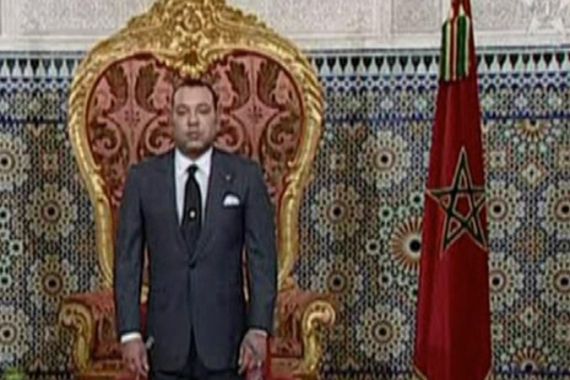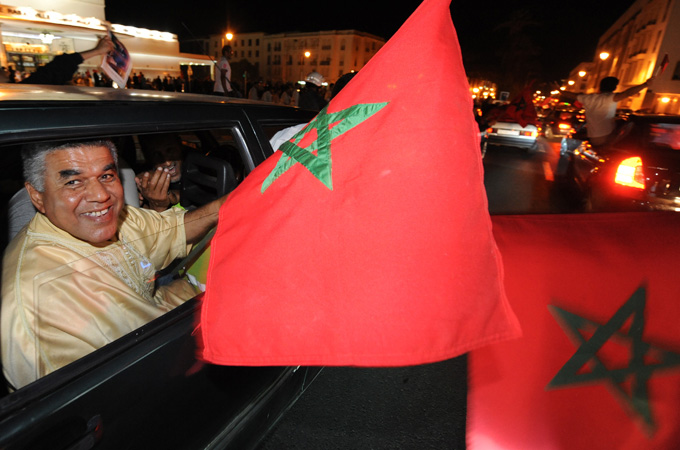Timeline: The reign of King Mohammed VI
Key dates in the reign of King Mohammed VI.

 |
| King Mohammed promises a new democratic constitution that would devolve some of his powers [AFP] |
July 23, 1999 – King Hassan II dies from a heart attack and his son Mohammed VI, 35, ascends the throne.
May 16, 2003 – Suicide bombers set off five blasts in Casablanca. Forty-five people are killed including 13 of the bombers and about 60 are wounded.
September 2003 – Authorities coerce the moderate Islamists of Justice and Development Party to limit the number of their candidates at local elections amid a security crackdown that followed the Casablanca attacks.
October 2003 – King Mohammed says he will reform family law, protecting women’s rights in marriage, allowing them to seek divorce and raising their minimum marriage age to 18 from 15.
January 23, 2004 – Morocco adopts a new family code giving women improved rights, despite opposition from Islamists.
January 2004 – King Mohammed sets up a special reconciliation commission to deal with past human rights violations.
December 16, 2005 – The Arab world’s first truth commission says about 592 Moroccans were killed at the hands of the government between the 1960s and 1990s, a period known as “the years of lead”. Victims and their families are compensated but none of the killers is named or punished.
March 2007 – Abdelfattah Raydi blows himself up in a Casablanca cafe to avoid arrest. Authorities said Raydi led a ring of more than 50 radical Islamists who planned to attack a quayside in Casablanca, barracks and police stations.
September 7, 2007 – With a voter turnout of 37 percent, Abbas El Fassi’s conservative Istiqlal party wins most seats at parliamentary elections and is named prime minister on Sept. 19, replacing Driss Jettou.
November 6, 2007 – King Mohammed criticises Spanish King Juan Carlos’s visit to the disputed enclaves of Ceuta and Melilla, saying it hurt the feelings of the Moroccan people and might imperil bilateral ties.
September 2008 – Initiates religious reforms aiming to counter the rise of fundamentalist imams.
October 2008 – Morocco obtains “advanced status” relations from the European Union, which will eventually give it greater access to Europe’s single market
June 13, 2009 – A new Moroccan political party spearheaded by a close friend of the king wins most seats in local elections after pushing opposition Islamists to the sidelines.
November 6, 2009 – The king calls for action against traitors who threaten the country’s “territorial integrity”, a direct warning to Western Sahara independence campaigners in a speech marking 34 years since Morocco took control of the territory.
January 3, 2010 – King announces a new consultative body to study a shift towards more regional government including the Western Sahara and help modernise state institutions.
February 20, 2011 – Marches calling for King Mohammed to give up some of his powers and dismiss the government draw thousands in more than 50 cities and towns, in the biggest anti-establishment protests the country has witnessed in decades.
March 9, 2011 – King Mohammed announces he will overhaul the constitution and set up a hand-picked committee to draft changes by June, including a stronger parliament, a bigger role for local officials and an independent judiciary.
April 28, 2011 – Seventeen mostly-European tourists are killed when a blast rips through a cafe overlooking Marrakesh’s Jamaa el-Fnaa square. Al Qaeda in the Islamic Maghreb later denies hints by the Moroccan government of its responsibility.
May 8, 2011 – Thousands of protesters march in Marrakesh and Casablanca demanding reform and opposing militant violence after the April attack. The rallies are the latest in a series organised by the February 20 youth movement.
May 15, 2011 – Several people are wounded after security forces violently prevent activists of the February 20 Movement from holding a sit-in in front of what the group said is the headquarters of the domestic intelligence services that also serves as a secret detention facility outside Rabat.
May 22, 2011 – Police use truncheons to break up new anti-government protests in several cities, apparently signalling tougher government line against the February 20 Movement.
June 17, 2011 – King Mohammed promises a new democratic constitution that would devolve some of his powers to parliament and the government. He says Moroccans would be able to vote for the changes in a July 1 referendum.